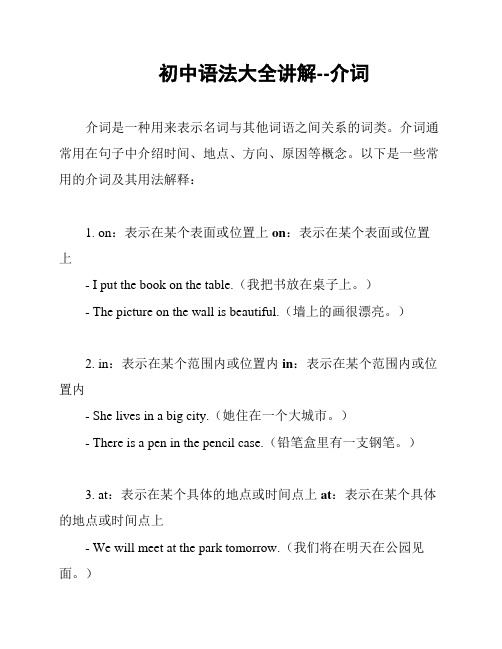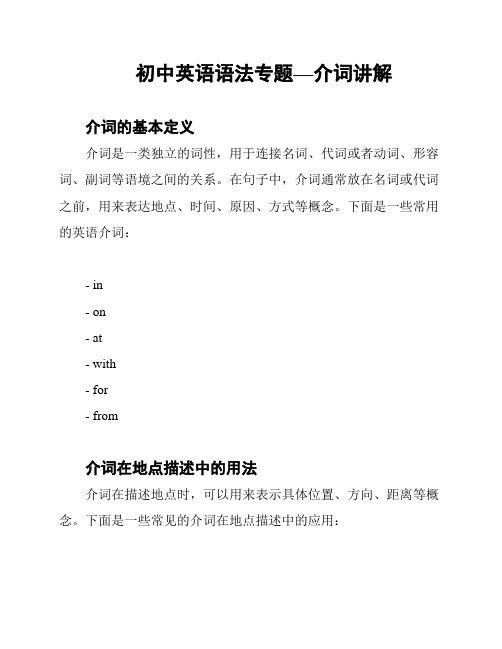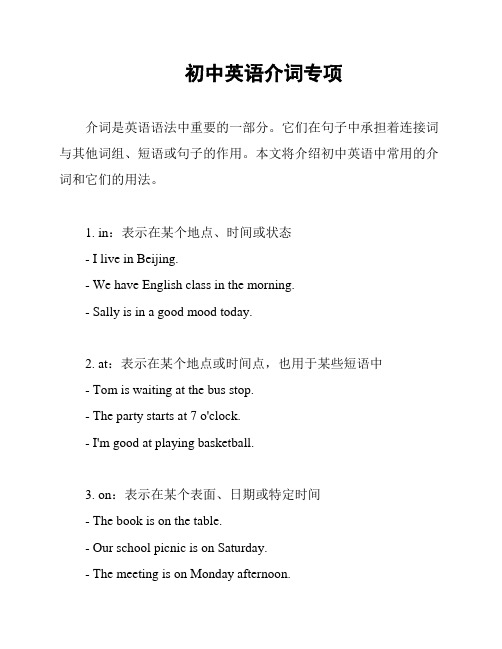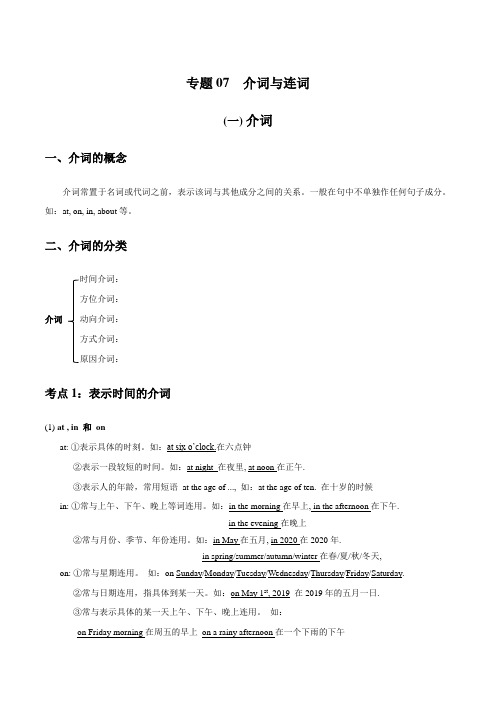初中语法专题7介词专题
初中语法大全讲解--介词

初中语法大全讲解--介词介词是一种用来表示名词与其他词语之间关系的词类。
介词通常用在句子中介绍时间、地点、方向、原因等概念。
以下是一些常用的介词及其用法解释:1. on:表示在某个表面或位置上on:表示在某个表面或位置上- I put the book on the table.(我把书放在桌子上。
)- The picture on the wall is beautiful.(墙上的画很漂亮。
)2. in:表示在某个范围内或位置内in:表示在某个范围内或位置内- She lives in a big city.(她住在一个大城市。
)- There is a pen in the pencil case.(铅笔盒里有一支钢笔。
)3. at:表示在某个具体的地点或时间点上at:表示在某个具体的地点或时间点上- We will meet at the park tomorrow.(我们将在明天在公园见面。
)- He is waiting for you at the front door.(他在门口等你。
)4. to:表示朝向某个目标或对象to:表示朝向某个目标或对象- She walked to school.(她走向学校。
)- Can you pass the book to me?(你能把书递给我吗?)5. with:表示伴随或使用某个工具或对象with:表示伴随或使用某个工具或对象- I went to the park with my friends.(我和我的朋友一起去了公园。
)- He wrote the letter with a pen.(他用钢笔写了这封信。
)6. by:表示通过某种方式或交通工具by:表示通过某种方式或交通工具- We usually go to school by bus.(我们通常坐公交车去学校。
)- She sent the gift by mail.(她通过邮寄发送了礼物。
初中英语语法专题—介词讲解

初中英语语法专题—介词讲解介词的基本定义介词是一类独立的词性,用于连接名词、代词或者动词、形容词、副词等语境之间的关系。
在句子中,介词通常放在名词或代词之前,用来表达地点、时间、原因、方式等概念。
下面是一些常用的英语介词:- in- on- at- with- for- from介词在地点描述中的用法介词在描述地点时,可以用来表示具体位置、方向、距离等概念。
下面是一些常见的介词在地点描述中的应用:- in:用于表示在某个范围之内的位置,例如 "in the room"(在房间里),"in the park"(在公园里)。
- on:用于表示在表面、平台或者位置上的状态,例如 "on the table"(在桌子上),"on the bus"(在公交车上)。
- at:用于表示在某个具体位置或者地点,例如 "at the cinema"(在电影院),"at school"(在学校)。
- to:用于表示朝向某个位置的移动,例如 "go to the park"(去公园)。
介词在时间描述中的用法介词在描述时间时,可以用来表示具体时间、时间段等概念。
下面是一些常见的介词在时间描述中的应用:- at:用于表示具体的时间点,例如 "at 7 o'clock"(在7点钟)。
- on:用于表示具体的日期或者星期几,例如 "on Monday"(星期一),"on January 1st"(1月1日)。
- in:用于表示较长的时间段或者某一个时间段内,例如 "inthe morning"(早上),"in July"(在七月)。
介词在原因描述中的用法介词在描述原因时,可以用来表示某事的起因或者原因。
江苏省苏州市中考英语语法专题练习7《介词》

《介词》1.掌握常见介词的基本用法;2.学会运用由介词构成的短语;3.区分运用易混淆介词。
时间介词( )1. We all like watching the TV program Readers Saturday evening.A in B. on C. at D. for( )2. Over 10,000 runners joined a half and a mini marathons in Xianlin, Nanjing May 7, 2017.A. inB. onC. atD. by( )3. It is reported that heads of the state 29 foreign countries attended the Belt and Road Forum for International一带一路国际合作高峰论坛) May 14 and 15,2017.A in; at B. at; forC. from; onD. of; in( )4. 一When is the Art Festival party?一It's seven o'clock the evening of November 18th.A. at; inB. at; onC. on; inD. in; on( )5. 一I haven't finished the book report of Journey to the West. It's so difficult.一You should hurry up. The report is due three days.A. inB. forC. onD. at( )6. 2000, this company has seen much new development. It has become one of the biggest companies in the country.A. ForB. InC. ByD. Since( )7. Father brought his little boy to a concert. But he was too young to sit the whole concert.A. forB. withC. duringD. through( )8. 一Did you get WeChat red packets(微信红包) the Spring Festival?一Yes. It's actually the most popular way of sending traditional holiday presents now.A. withB. forC. duringD. after方式介词( )1. My son lives a little far from his office, so he always goes to work bus.A. onB. byC. withD. in( )2. How does Jane with her mother? making phone calls or chatting onlineA. keep in touch; WithB. keeping touch; ByC. keep in touch; ByD. keeping touch; With方位介词( )1. A bird flew into the kitchen the window.A. acrossB. aboveC. throughD. under( )2. Nora opened the box. To her surprise, it was a gold watch.A. outsideB. insideC. besideD. behind( )3. 一Why are you unhappy these days, Julie?一I can't see the blackboard because two tall boys sit me.A. behindB. next toC. in front ofD. between( )4. 一Taiwan is an important part of China.一Yes it lies the southeast of China.A in B. on C. to( )5. A woman stood the window, watching the children playing games inthe garden.A. pastB. throughC. acrossD. by( )6. I can't see Lucy because she is the tree.A. in front ofB. behindC. next to其他常见介词( )1. There's one taken by the River Seine these photos. Can you find itout?A. exceptB. includingC. betweenD. among( )2. 一I'm thirsty. I'd like a glass of orange juice. What about you, Dad?一I prefer a cup of coffee nothing in it.A. withB. withoutC. forD. to( )3. 一If someone is your way, what will you do?一I will wait until he or she moves instead of pushing past.A. inB. onC. byD. along( )4. Your gloves should be made leather, for they feel soft and smooth.A. inB. onC. forD. of( )5. Music has become a bridge the East and the West.A. inB. atC. amongD. between( )6. I met Mary, and she lent me ¥20. It was kind her to lend me the money.A. forB. ofC. withD. in( )7. The population of our city has increased 40% compared with of 3 years ago.A. by; thatB. to; thoseC. with; onesD. of; it( )8. Since you are danger, why not ask help?A. in; forB. in; toC. with; forD. with; to( )9. I bought some flowers my mom my best wishes on her birthday.A for; with B. to; forC. of; toD. from; with( )10.一Your best friend is really talented learning foreign languages.一Yes, he is also good other subjects.A in; with B. at; forC. in; atD. at; to( )11. 一Do you have anything else to say for being late again?一No, nothing sorry.A. aboveB. behindC. fromD. but( )12. 一Reading is a good way to spend the time on the plane.一That's true. I never go travelling a bookA. withoutB. fromC. onD. about( )13. 一What do you often do classes to relax yourselves?一We often do some running or listen to music.A. inB. throughC. betweenD. among( )14. 一Can you come to my party this evening?一Sorry, I can't. I have to prepare my exams.A. ofB. forC. aboutD. with( )15. 一Thanks our government, we can play sports on the new playground next week.一That's for sure! And we'll have sports meeting one month.A. for; inB. to; inC. for; afterD. to; after介词短语( )1. Grace often gets nervous before she gives a speech .A. in publicB. in totalC. in common( )2. MissLi, , is active all the time. Although she has not been well these days, her class is still full of laughter.A. As you knowB. start withC. all in all( )3. 一Most of the wild animals are because of their bad living environment.一So we must do something to save them.A. in needB. on dutyC. at workD. in danger( )4. When you're invited to have dinner at home by an American friend, you should be or a little later. It's different from our Chinese custom.A. on timeB. on businessC. on show( )5. 一 , there must be life on other planets though none has been discovered.一I agree with you. The universe is so large after all.A. To my surpriseB. To be honestC. In my opinionD. Again and again( )6. the scientists' hard work, Tiangong II was launched(发射)successfully.A. As forB. Thanks toC. Instead ofD. According to参考答案时间介词1-8 BBCBADDC方式介词1-2 BC方位介词1-6 CBCADB其他常见介词1-10 DAADDBAAAC 11-15 DACBB介词短语1-6 AADACB。
初中英语介词专项

初中英语介词专项介词是英语语法中重要的一部分。
它们在句子中承担着连接词与其他词组、短语或句子的作用。
本文将介绍初中英语中常用的介词和它们的用法。
1. in:表示在某个地点、时间或状态- I live in Beijing.- We have English class in the morning.- Sally is in a good mood today.2. at:表示在某个地点或时间点,也用于某些短语中- Tom is waiting at the bus stop.- The party starts at 7 o'clock.- I'm good at playing basketball.3. on:表示在某个表面、日期或特定时间- The book is on the table.- Our school picnic is on Saturday.- The meeting is on Monday afternoon.4. by:表示通过某种方式或通过某种交通工具- We went to school by bus.- He sent the message by email.- She solves math problems by using a calculator.5. with:表示与某人一起或用某物- I went to the movie with my friends.- Can you write with a pen?- Sarah cooked dinner with fresh ingredients.6. from:表示起点或来源- The train departs from Shanghai.- This gift is from my parents.- I learned English from my teacher.7. to:表示方向、目的地或目标- Lisa walked to the park.- We are going to the supermarket.8. for:表示目的、利益或时间段- I bought this book for studying English.- He exercises for his health.- The party lasted for four hours.以上是初中英语中常见的介词及其用法。
【初中英语】初中英语关于介词的语法大全

【初中英语】初中英语关于介词的语法大全
【—关于介词的】下文是老师为同学们带来的关于介词的介绍,及介词是什么?供同学们参考。
介词
为什么先说介词
因为在英语测试中,介词的用法较为普遍
它是一种用来表示词与词, 词与句之间的关系的词
在句中不能单独作句字成分
介词后面一般有名词代词或相当于名词的其他词类,短语或从句作它的宾语
介词和它的宾语构成介词词组,在句中作主语, 状语,表语,补语或介词宾语
比如说:
Most of the students went to the classroom. 大部分学生去了教室。
We play basketball on the sports ground. 我们在操场上打蓝球。
介词常与动词,形容词,名词一起构成固定搭配
比如说:
belong to 属于;rely on 依靠;talk to 同...谈话;be afraid of 害怕;be strict with对...严格
介词一般放在名词之前
但它后面的介词宾语是疑问代词、疑问副词或者关系代词时
这些词就提到了前面
剩下介词在后了
比如说:
Where do you come from? 你是哪儿人?
Who are you talking to? 你在跟谁谈话呢?
What do you study for? 你为了什么而学习?
这些词看似不难,却使许多同学苦不堪言
其实介词的使用有规可循,同学们只要记住了规律,万变不离其宗
希望同学们要好好的掌握介词的用法,如果还有不懂的可以参考例句进行学习哦!
感谢您的阅读,祝您生活愉快。
初中英语语法介词

初中英语语法介词介词在英文中是一种虚词,在英语里面的使用频率特殊高。
下面是学习啦我为你整理的初中英语的介词语法,希望大家宠爱!常用介词的用法1. 在的前面in front of (范围外的前面)in the front of (在范围内的前面)There is a river ________ my house.我家前面有一条河。
There is a blackboard ___ our classroom .教室前面有一块黑板。
2.在树上on the tree 强调树上长出的东西(苹果,橘子)in the tree 外来物体(人,鸟,风筝)There are some birds _____ the tree.树上有一些鸟。
There are some apples _______ the tree.树上有一些苹果。
3.时间表达:in + 某月/ 某季节/ 某年(时间长)on + 某天(中)at + 具体几点几分(短) 固定短语:in the morning / afternoon / evening at night, at noon练习:__January , __ summer, ___ 2021______ Sunday, ___ March 4th, ___ March___ _ Sunday morning,_____ the morning_______ the morning of June 5th_______ 6:30, ____ night, __ noon4.在墙上on the wall在墙壁外表(相片photo,图画picture)in the wall在墙壁的里面(门door, 窗户window )(1)There is a photo of my family_______ the wall.(2)There are two doors ______ the wall.5. 在之上on:在的外表之上(物体之间有接触)over: 在的正上方(物体没有接触)above 高于......;在......之上',多指在相对较高位置(1)There is a book ______ the desk.书桌上有一本书。
课件3:专题7 介词和介词短语

8. into 将纸条“放入”口袋里。 9. at 因look at表示“看”。 10. of 因of use =useful。 11. at 因knock at the door表示“敲门”。 12. at 因at the door表示“在门口”。 13. at 因at once表示“立即,马上”。 14. for 因look for表示“寻找”。 15. in 因表示“惊奇地”用in surprise。
语法专题
专题7 介词和介词短语
介词与高考 介词后一定要接宾语,作宾语的通常是名词、代词或动名 词或what从句。 1.做语法填空时,若空格后是名词、代词或动名词或what 从句,且他们在句中不是作主语、表语或动词的宾语时,这 个空格就很可能是填介词。然后根据句子意思和空格前后词 语的搭配习惯来确定填哪一个介词。 2.在短文改错中,主要考查介词的多用、误用、漏用以及 介词后接动词原形而不是动名词。
6. Jane stopped where a small crowd of men had gathered. She found some good quality pipes _o_n__sale.
固定搭配on saleБайду номын сангаас 表示“出售”。
7. When Jane got home, with her small but well-chosen present in her bag, her parents were already __a_t table having supper.
专题07 介词与连词_备战2021年小升初英语必考语法和题型(解析版)

专题07 介词与连词(一)介词一、介词的概念介词常置于名词或代词之前,表示该词与其他成分之间的关系。
一般在句中不单独作任何句子成分。
如:at, on, in, about等。
二、介词的分类时间介词:方位介词:介词动向介词:方式介词:原因介词:考点1:表示时间的介词(1) at , in 和onat: ①表示具体的时刻。
如:at six o’clock.在六点钟②表示一段较短的时间。
如:at night 在夜里, at noon在正午.③表示人的年龄,常用短语at the age of ..., 如:at the age of ten. 在十岁的时候in: ①常与上午、下午、晚上等词连用。
如:in the morning在早上, in the afternoon在下午.in the evening在晚上②常与月份、季节、年份连用。
如:in May在五月, in 2020在2020年.in spring/summer/autumn/winter在春/夏/秋/冬天, on: ①常与星期连用。
如:on Sunday/Monday/Tuesday/Wednesday/Thursday/Friday/Saturday.②常与日期连用,指具体到某一天。
如:on May 1st, 2019 在2019年的五月一日.③常与表示具体的某一天上午、下午、晚上连用。
如:on Friday morning在周五的早上on a rainy afternoon在一个下雨的下午on the evening of May 5th在五月五日的晚上(2) before 和after 用来表示时间的先后顺序before:在……之前after:在……之后如:Spring comes before summer. 夏天之前是春天。
Come to my office after class. 放学后来我的办公室。
(3) from 用来表示从某段时间开始的动作,常与to 连用构成短语“from…to…”译为“从……到……”。
- 1、下载文档前请自行甄别文档内容的完整性,平台不提供额外的编辑、内容补充、找答案等附加服务。
- 2、"仅部分预览"的文档,不可在线预览部分如存在完整性等问题,可反馈申请退款(可完整预览的文档不适用该条件!)。
- 3、如文档侵犯您的权益,请联系客服反馈,我们会尽快为您处理(人工客服工作时间:9:00-18:30)。
介词介词是一种用来表示词语词之间、词与句之间的关系的词,在句中不能单独做句子成分。
介词分为简单介词和短语介词两种。
简单介词即单个介词,如in,under,on,for,after等;短语介词指多个单词构成的介词,如in front of,instead of,far from等。
介词短语与短语介词不同。
介词短语指由“介词+名词/代词等”构成的短语,如at school,by bus,on Sunday等,在句中可以作定语、状语、表语、宾语补足语等。
有些单词,既可以作介词,也可以作连词(作连词时,其后接句子),如after,before等;而有些单词,既可以作介词,也可以作副词,如above,below等。
介词是中考试卷中的“常客”,从时间上看,年年都要考;从地点上看,每个地区都要考。
考查介词的主要题目有:单项填空、完形填空、短文填空及句子翻译等。
一、对时间介词的考查【例题】1. I was born ______ December 17. This year I’ll hold a birthday party for it athome.A. onB. atC. inD. by2. —Do you know Victory Day in China?—Yes, it’s ______ September 3rd ______each year. It tells the world that Chinese peoplelove peace and hate wars. Chinese people will never forget the history.A. in; onB. on; /C. at; /D.on; in3. For many Western people, they drink cold water even ______ winter.A. onB. forC. atD. in4. —The charity walk begins ______ 9:00. Don’t be late.—No problem.A. atB. byC. inD. on5. The Dragon Boat Festival this year will come ______ four days.A. afterB. forC. duringD. in6. (短文填空)After walking around ________ some time, she came toa river.7. (首字母填空) He has been away from home s________ two days ago.8. (句子填空) The Highland Museum is opened every day ______ Monday.二、对地点、方位介词的考查at, in, on表示地点的用法:①at表地点时,指空间位置上的某一点,后面常接小地方。
如:at the bus stop;②in表地点时,指在某一立体空间范围内,后面接大地方。
如:in shanghai;③on表地点时,指某物与另一物表面相接触,或与某地方接壤等。
如:on the table等。
in, on, to表示方位的用法:①范围之内用in;②相邻、接壤用on;③不相邻或隔海相望用to。
【例题】9. —I like the weather in Kunming. It’s warm all year long.—Yes. And the temperature stays ______ zero all the time.A. atB. belowC. aroundD. above10. In cold winter, the temperature in Harbin often remains ______ zero all day.A. aboveB. belowC. overD. under11. The bank is ______ the bookstore and the post office.A. at the front of D. among C. between D. in12. You must be careful when you swim ______ the lake.A. acrossB. belowC. overD. through13. —Excuse me, where is the bookstore?—Go ______ the bridge. You’ll see it on your left.A. onB. crossC. acrossD.through14. Heilongjiang Province is _____ the northeast of China.A. toB. inC. onD. at15. Cambridge is a small city ______ the east of England.A. betweenB. withC. inD. under16. Jim sits behind me, so I sit ______ him.A. at the top ofB. at the end ofC. in the middle ofD. in front of三、对手段、方法介词的考查【例题】17. Ma Yun, the Chairperson of Alibaba Group, has made much money _____the Internet.A. throughB. alongC. acrossD.towards18. More and more people in Shanghai choose to go to work ______ underground.A. inB. withC. byD. for19. Gina, what’s this ______ English?A. byB. forC. inD. with20. We can save money ______ cooking our own meals instead of eating outside.A. byB. toC. forD. with四、对其他常用介词的考查【例题】21. —Do you remember what she looked like when you first met her?—Of course. She was tall and thin ______ long hair.A. inB. withC. onD. for22. Jack had to stop working though it was ______ his own wishes.A. onB. forC. againstD. by23. Wild animals are our friends. We shouldn’t kill them ______ food or clothing.A. inB. withC. aboutD. for24. It is great ______ us to get so many favourite books onI n t e r n a t i o n a lChildren’s Book Day.A. toB. withC. ofD. for25. He looked at me and, ______ a word, smiled.A. inB. withC. withoutD. for26. All of us went to the park ______ Bob. He had to look after his sister.A. besidesB. withC. exceptD.besides五、对介词短语的考查【例题】27. My mother says my friend is similar ______ me, but I think shei s d i f f e r e n t______ me.A. as; fromB. to; fromC. to; toD. as; to28. This photo reminded the old man ______ the days when he was young.A. withB. forC. byD. of29. They hope it can protect them ______ terrible air.A. inB. fromC. forD. at30. When the king saw that she as playing his old harp, he was filled ______ joy.A. inB. ofC. byD. with31. This kind of dress is ______ this year, and I really want to get oneA. in dangerB. in troubleC. in styleD. intime32. Mr. Yang’s daughter is pretty good ___ drawing pictures and won many prizes.A. withB. forC. inD. at33. Shen Xue and Zhao Hongbo won the gold medal for China sow e’r e p r o u d ______ them.A. inB. onC. ofD. for34. I learn ______ my teacher and my classmates at the corner.A. toB. atC. forD. from35. Compared ______ some unhappy people, those who are always p l e a s e d a n d relaxed are less likely to suffer colds.A. atB. withC. inD. of 附:介词的省略三、即时训练1. This food is free. You don’t have to ______ it.A. look forB. pay forC. ask forD. wait for2. You see, Kevin is writing ______ his left hand.A. atB. asC. forD. with3. ______ age 7, Bruce won second prize in the piano competition.A. InB. AtC. OnD. For4. We can be thankful every day, not just ______ Thanksgiving Day.A. inB. onC. toD. by5. This school is different ______ others. It has many out-of-classactivities.A. offB. fromC. ofD. for6. Jessica took part in the English competition ___ the morning of April tenth.A. inB. onC. toD. by7. Don’t play computer games too much. It’s bad ______ your eyes.A. forB. withC. onD.at8. Sam likes skating very much. He has been skating ____ four hours.A. forB. sinceC. withD.in9. —When is Henry’s birthday party, Lynn?—The 18th, ______ about three o’clock in the afternoon.A. inB. atC. onD. to10. Remember to run ______ the road quickly while it is clear.A. acrossB. forC. afterD.of11. —Excuse me. Where is the Hope Cinema?—Go up this road to the end. Go ______ the bridge and you’ll find it.A. crossB. crossingC. acrossD.down12. Zhang Mei really wants to improve her English. She oftenpractises English ______ chatting with her English friend Tony.A. inB. byC. forD.with13. —What are Mexicans supposed to do when they meet ___ thefirst time?—They are supposed to shake hands.A. forB. onC. amongD.in14. Don’t worry ______ your physics. I will help you ______ it.A. with; aboutB. about; onC. on; aboutD. about; with15. They had a picnic ______ the foot of the mountain last Sunday.A. forB. toC. ofD. at参考答案:1-5. ABDAD 6. for 7. since 8. except9-10. DB 11-15. CACBC 16-20. DACCA 21-25. BCDDC 26-30. CBDBD 31-35. CDCDB即时训练1-5. BDBBB 6-10. BAABA 11-15. CBADD。
